8 Ways to Protect Your Money and Valuables While Traveling
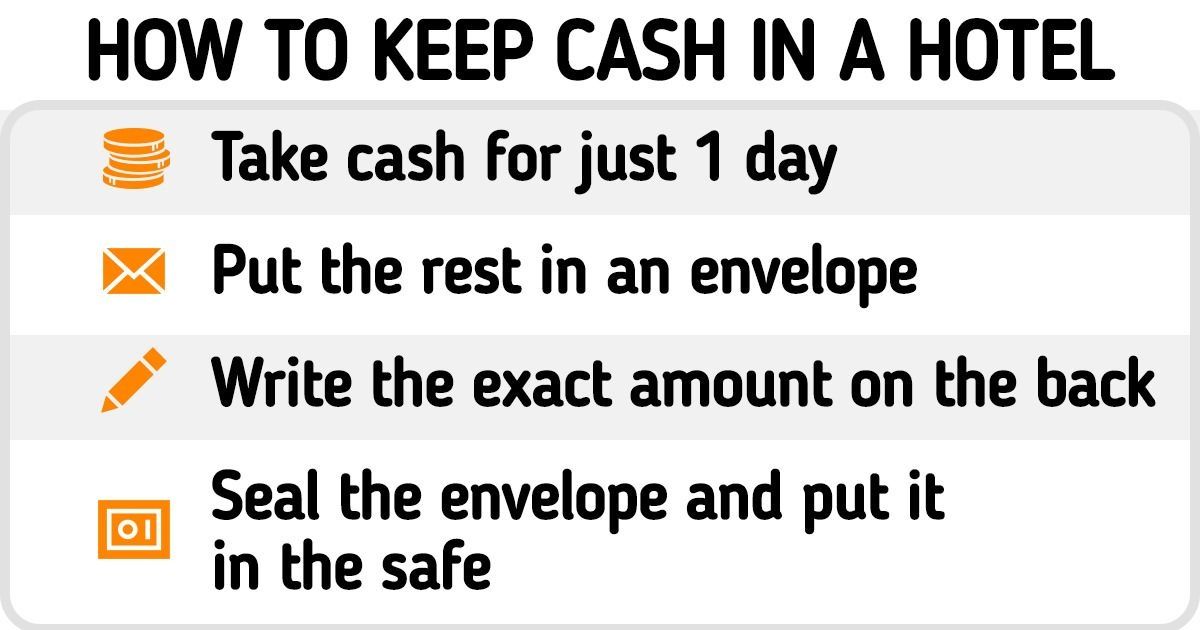
Traveling is a great way to relax and take a break from your regular routine. Unfortunately, when we are traveling, we might be so relaxed that we lose our money by falling victim to criminals that target tourists.
5-Minute Crafts has reviewed the recommendations of experts and prepared instructions on how to protect money, documents, and devices from getting lost or being stolen.
1. Take several bank cards
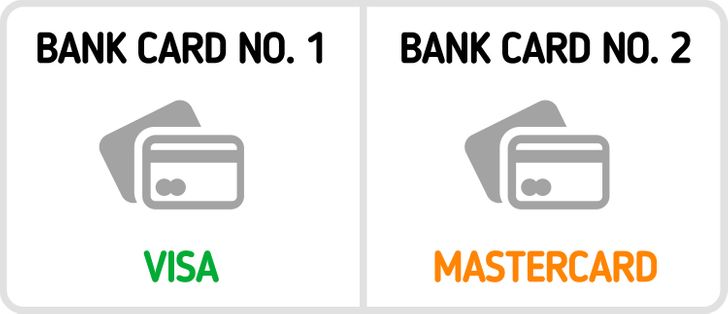
It’s better to take credit cards from different banks and payment systems. So, if your bank card gets blocked because of suspicious transactions (banks often do that), you can still use another card. And if a store doesn’t take a card from a certain payment system, you can always pay with a different one.
You can also prevent your card from getting blocked if you warn your bank about your future trip. Call the hotline and tell them where you are going and when. This way, the bank will know that you are the one using the card and won’t block it.
2. Don’t store all of your money in one place.
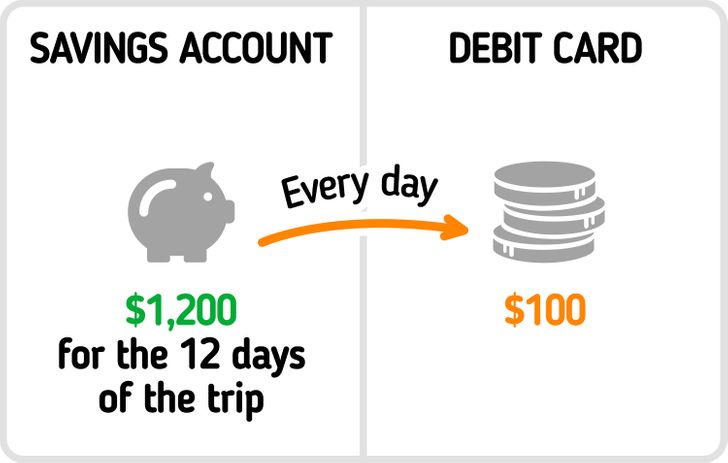
Distribute the money for your vacation among all the cards you have with you or transfer the biggest amount to a savings account. You will want to have access to the account through an application on your phone and you shouldn’t link it to any bank cards.
For example, if you have $1,200 for 12 days of a trip in your savings account, this means you are planning to use $100 a day. And you have another account in the same bank with a card linked to it. Every morning, before you leave the hotel, you transfer $100 from the savings account to the active one. So, even if you lose the credit card that same day, most of your money will still be safe.
3. Use additional security measures.
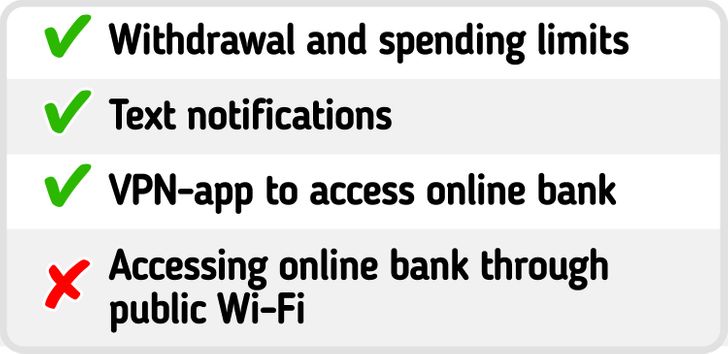
-
Set limits for cash withdrawals on all of your cards so even if someone steals your card, they won’t be able to steal a lot.
-
Make sure that you receive text notifications on all of your bank cards. If you get a notification in time, you will have the chance to block the card before you lose all of your money.
-
Don’t use public Wi-Fi to access an online bank.
-
If you really need to, use a hotel Wi-Fi connection. And don’t forget to use VPN-services to protect the connection.
4. Keep your cash safe.
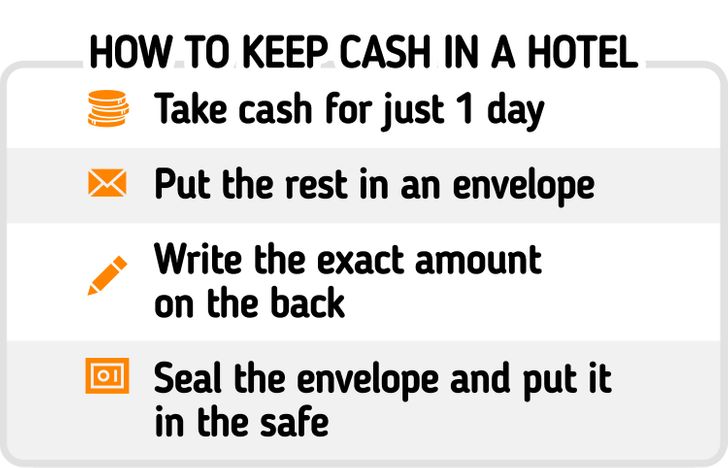
Don’t withdraw a lot of cash: almost everyone takes cards now. But if you are in a country that only takes cash, divide the amount of money into several parts and keep them in different places. Ideally, it should be inside the pockets of your clothes.
Only use ATMs only in bank buildings or malls where there is CCTV. ATMs outside are not safe. There might be some devices, like fake keyboards, that are hard to notice right away.
When leaving the hotel, don’t take more money than you need for one day. If you lose it, or if it gets stolen, most of your money will still be safe.
The rest of your cash should be stored in the safe of the hotel you’re staying at. Place the cash into an envelope, seal it, and write the exact number on the back. So you will be safe in case the hotel employees want to steal your money.
5. Take care of your personal belongings.
-
Don’t leave your personal belongings unattended and keep them close.
-
If possible, don’t take expensive devices with you or try to make them as unattractive for criminals as possible. For example, get an old case for your phone. You can do the same with your laptop or camera. Another option is to put stickers on them to make them look simple and cheap.
-
Keep your camera in a simple case with a strong strap. Keep it in the bag and only take it out when you need to take a photo.
-
When traveling to a city, find out which parts of the city are considered to be more dangerous and stay in safe places.
6. Protect the data on your devices.
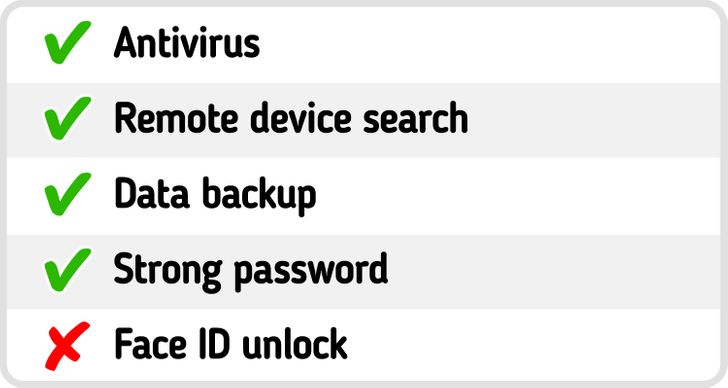
Install good antivirus software on your phone and laptop, and don’t forget to update it before traveling. Good software also has additional functions to improve the security level. For example:
- device search
- remote blocking or deleting of data
- turning on a loud siren
- taking photos of the thief
Make sure you make a backup of all the data from your smartphone and your laptop. Save the backup on an external hard drive, or a cloud service.
Set strong passwords for all your devices and use fingerprint protection. Don’t use Face ID. It’s easy to trick using photos from social media.
7. Scan all your documents.
Before the trip, make scans or photographs of the documents that you are taking with you, like:
- your national ID or passport
- your international ID or passport
- your driver’s license
- your medical insurance
Save the files on a drive, cloud service, or in an e-mail. If you lose some of your documents, you can restore them faster if you have copies.
8. Save all necessary phone numbers.
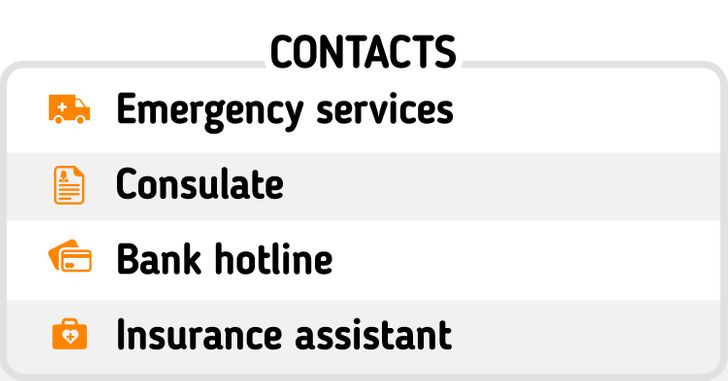
If the vacation is in a different country, save the following contact information:
- emergency numbers: fire services, police, and ambulance. It’s probably 112 or 911. You can dial this number even if you have no money. But this number may not work everywhere, so make sure you check it for the location you are going to.
- phone number and embassy address for your country. You might need this info if you lose your passport and have to restore your ID to return home.
- phone numbers of all the banks you have cards from. You need these to block the cards if you lose them or someone steals them.
- your insurance company’s phone number. If you need medical help, you can call this number quickly.
5-Minute Crafts gets commissions for purchases made through links in this post.